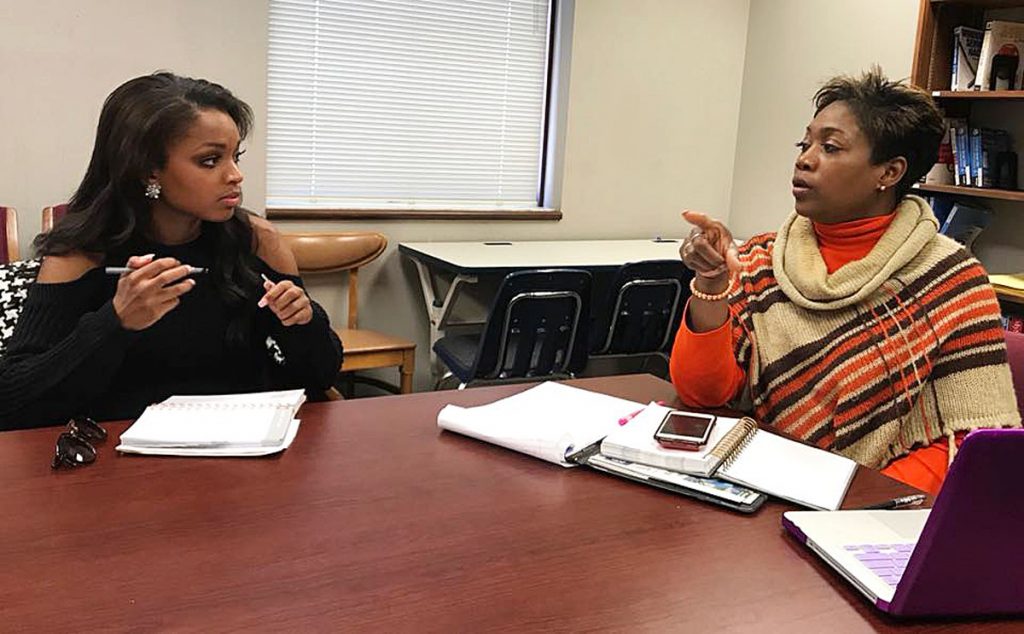Ole Miss Most Beautiful 2018 Asya Branch is leading a recently launched group of UM students in serving children whose parents are, or have been, incarcerated. The new service group will hold its kickoff meeting at 6:30 p.m. Tuesday in Guyton Hall.
Serving Children of Incarcerated Parents (SCIP) aims to support these families will help break the cycle of children with incarcerated parents becoming incarcerated themselves and, in turn, will lower the future number of children who grow up with incarcerated parents
Branch, a junior integrated marketing communications major, is passionate about her group and its purpose because she is a child of an incarcerated father. Branch said she had no resources to help her navigate the difficulties of growing up with an incarcerated father, and she strives to be a person that other children of incarcerated parents can feel comfortable talking to.
“I have made it my duty to make a difference throughout our state and in the lives of children like me,” Branch said. “There are many undiscussed topics and several needs for children of incarcerated parents, and I plan to continue spreading awareness and hopefully get several others involved.”
While competing in pageants such as Ole Miss Parade of Beauties and Miss Mississippi, Branch has used her experiences as a platform to empower others in similar situations. She created SCIP as a way to make a difference in the lives of children in Oxford and its surrounding communities.
In Mississippi alone, 55,000 children have at least one parent who has been incarcerated. This number represents roughly seven percent of children in Mississippi and equals the national average of children of incarcerated parents.
Serving Children of Incarcerated Parents’ goal is to promote personal involvement in the lives of children with incarcerated parents, to prepare university students to become effective one-on-one mentors for these children and to work with locals to assist these children in achieving their goals.
Throughout the past year, Branch has visited numerous schools and spoken to over 600 children about how to pursue their aspirations. She said seeing the difference she has made in the lives of those students was enough to make her want to continue her work on the issue, which is why she decided to implement this new service group on campus.
“What better place to spread awareness for a serious cause than your own university?” Branch said.
Deetra Wiley, a University of Mississippi business applications analyst, had a hand in creating this organization with Branch. Wiley is also a child of an incarcerated parent, and like Branch, she believes in the power of mentoring children who grew up in situations similar to her own. Wiley is the organization’s staff advisor and will be helping Branch use university funds and donations to accomplish its goals.
“We want to serve these children through storytelling and doing other services that will be beneficial in creating a nurturing and loving environment for these kids,” Wiley said.

Asya Branch speaks with staff advisor Deetra Wiley about launching Serving Children of Incarcerated Parents. The organization’s purpose is to serve children whose parents are, or have been, incarcerated. Photo courtesy: Facebook
Vinesh Patel, Serving Children of Incarcerated Parents treasurer, was enlisted to help start the organization by Branch, his friend and high school classmate.
“She reached out to me as she needed people to jumpstart this program,” Patel said. “It was a good concept when she told me over the phone, and I wanted to help because I like to be around kids. After hearing about it, I thought, ‘Why not?’”
Patel is not a child of an incarcerated parent but wants to be a positive role model in the lives of those children who are.
“When I see little kids think about the future, I want them to grow up with a positive lifestyle,” he said. “This [organization] allows me to be with children whose parents are currently incarcerated and be a light to them when their parents cannot be.”
Branch, Wiley and Patel all believe in a mentorship program because of the harsh statistics related to children of incarcerated parents.
According to a study by the Annie E. Casey Foundation, children of incarcerated parents are less likely to live in neighborhoods where they can be offered support from their community. The parents of these children often feel they cannot trust anyone to help with their children, resulting in little or no support for the child experiencing parental incarceration.
In the same study, it was shown that children of incarcerated parents were more likely to drop out of school, engage in troublesome behavior and, subsequently, become incarcerated themselves.
Tuesday’s meeting is open to the public and will offer members the chance to hear the stories of Branch and Wiley as well as share their own experiences and ideas for the organization. Though students with incarcerated parents are especially encouraged to join the organization and help mentor younger children, any University of Mississippi student is welcome to join the group and voice his/her thoughts.
“The plan is to give these children the necessities to be successful in a world that often doesn’t understand their situations,” Branch said. “I want to make people more aware of the effect that incarceration has on a family.”






